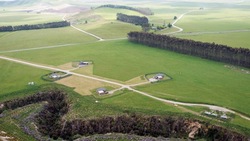The Dominion Post | 8 January 2016
Host countries should be watchful on foreign land sales
Chinese interest in New Zealand farmland was a hot issue in 2015. It isn't going to stop soon, writes Stuart McMillan.
OPINION: The Government's veto in September of the sale of Lochinver Station to a subsidiary of Shanghai Pengxin will not herald a decline in the interest by Chinese in buying New Zealand farmland.
A driving force behind the acquisition of farmland outside China is China's need for food security – ensuring that it has enough food to feed its immense and growing population.
That concern has led to Chinese buying or leasing land in many countries. For instance, XPCC , a quasi-military Chinese organisation, has obtained access to three million hectares in Ukraine for the next 50 years for growing crops and raising pigs. In Argentina, Chinese interests have access to 234,000 hectares. Chinese interests have bought several very large cattle stations in Australia.
Among the influences on China's food security concerns are:
* The sheer size of its population, now about 1.4 billion, and expected to increase to 1.45 billion by 2030 creates a demand for food. China has about 22 per cent of the world's population and about 8 per cent of the world's arable land. A high proportion of that arable land – a common estimate is 40 per cent - has been taken over by industry or urban development or is polluted. The central government's attempts to stop this have sometimes been thwarted by local officials who, by laziness, corruption, or an unwillingness to forgo the income from converting agricultural land to industrial or urban purposes, have reduced the extent of land that can be used for growing crops or raising livestock.
* China has pulled more than 600 million people out of poverty. A rich class has been created and a very large middle class. They eat more, particularly more meat. China is expected to consume 50 billion kilograms more food in 2020 than it did in 2010.
* China needs to maintain stability. Threats to stability may come from food shortages - present-day Chinese would not tolerate the largely politically-induced starvation of the Great Leap Forward in the 1958-1961 period during which tens of millions died. Nor will they tolerate unsafe food. Ensuring that food is affordable is another measure to maintain stability.
* Perhaps as many as 250m Chinese agriculturalists have moved from rural areas into towns and have to be fed. They once grew food for themselves. The movement was partly an attempt to create larger agricultural plots so that modern machinery could be used and production increased.
* China has, at least in practice, abandoned policies of being self-sufficient in food production. One of its last formal announcements – that of giving up producing enough grain – occurred at the beginning of 2014.
Although purchases or leasing of foreign farmland have been characterised in various ways, including as land grabs, making sure that a country has enough food is one of the basic tasks of a government. It is a rational response to seek productive land other countries are prepared to make available. The devil may be in the detail of practice but that is not a reason to dismiss the basic rationality in China's motivation.
Whether it is just as rational for countries to lease or sell land to citizens, firms or corporations of other countries is another question.
Around the world, there has been resistance to and suspicions about land purchases by Chinese. Brazil refused to sell the thousands of hectares wanted by Chinese investors. A way was found around this: credit was provided to Brazilian farmers to grow soybeans to feed chickens and pigs in China. Brazil, Argentina and Uruguay have all passed laws forbidding ownership of farmland by organisations or firms owned in whole or part by foreign governments.
China is, of course, far from the only country seeking to acquire farmland in foreign countries. It is sometimes difficult to work out whether an individual, an organisation or a firm buying or leasing the land is backed by the government, a condition that applies to other countries as well as to China.
A country making land available to foreign interests should impose certain conditions.
* It should make sure that the foreign farmer observes the agricultural practices and laws of the host country. If a foreign buyer or lessor of farmland offends against a country's environmental, animal health or quarantine practices and laws that runs the risk of endangering a country's whole economy.
* It should have the right to ensure that there is enough food to feed its own population.
* It should make thorough economic calculations. The Lochinver decision was made on the ground that the sale would not bring the required benefits to New Zealand. The economics should not stop there. If the foreign farmer dominates an agricultural processing plant, or dominates the transport routes, then the benefits to the host country may become minor indeed. After all, one of the main reasons for buying or renting foreign land is to avoid buying from an exporting country
* It should look after its intellectual property. If the foreign agricultural concern buys a processing plant it will usually acquire the intellectual property that plant holds – intellectual property that may have been developed by the host country's scientists and technologists. This of course applies to any commercial take-over. As a country with an advanced agricultural economy, it is a highly relevant consideration for New Zealand.
Foreign buying of land is not going to stop any time soon. It is up to the host country to look after itself.
Stuart McMillan is a senior fellow in the Centre for Strategic Studies at Victoria University of Wellington.












